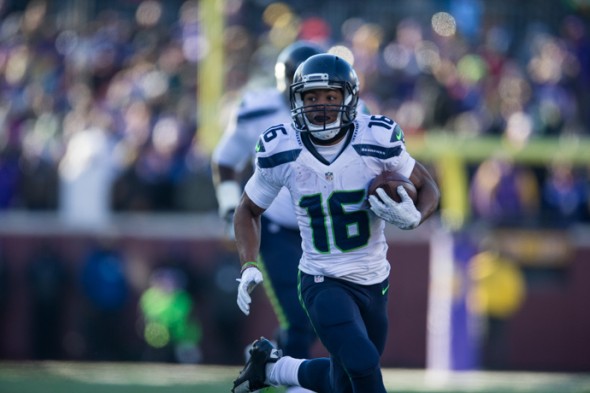
As he is prone to do, the guileless Tyler Lockett said something honest and worthy, this time about spending part of daily life sneaking around a virus.
“Practice is kind of like recess,” he said. “It gives time to be around people.”
The Seahawks’ No. 1 wide receiver was speaking about the lesser-understood aspect of the personal quarantines demanded by the NFL if it is to pull off the audacious stunt of having a season outside a bubble in a pandemic — the loneliness of isolation.
“I don’t want to put anybody in jeopardy (by violating safety protocols), but you got to understand you’re asking people to come up here and they live by their self,” he told reporters last week via Zoom. “A lot of people don’t know what it’s like to be isolated, just to be able to play football.
“That might be a good thing to the football fans to say, ‘We get to see football.’ But you really don’t know what it’s doing to people’s mentals.”
The subject came up because Lockett said he gave some serious consideration to opting out of the season for health reasons: “I definitely had a lot of hesitation,” he said.
Lockett has a genetic abnormality — the aorta is on the right side of his heart — although the condition is benign. He has a family history with asthma. Then in April, a cousin who had lived with him for awhile in Seattle before returning home was diagnosed with COVID-19.
“She had told me there was one day where her body was just aching so much, she had told (a co-worker) that she really didn’t think she was going to make it,” he said. “That (she didn’t know whether) her body was going to be able to deal with what she felt for another day.”
She survived her two-week ordeal. Similar family stories are everywhere in NFL, particularly because of the virus’s disproportionate impact on people of color. Lockett eventually was persuaded by the protocols set by the NFL and the Seahawks were sufficient to keep him safe, even though, per agreement with the players union, he could have taken a $350,000 stipend for this year and played next year for $8.15 million.
Beyond the physical risk, Lockett, who had a career-high 1,057 receiving yards last year, talked about the time after “recess.”
“We’re literally sitting at (the hotel) by ourselves,” he said. “You got rules that say you can’t go this place you can’t go do that. You really got to figure out how to deal with these mental health issues that a lot of people don’t know the individuals have . . . we have to be able to learn how to be open.”
As pandemic chores go, we all understand the times that aren’t football recess for players don’t compare to unemployed people sitting in cars in a food line in 100-degee Texas heat for six hours waiting for a few boxes of groceries to get them through another week.
But we all have our coping stories. So do the Seahawks.
CB Kemah Siverand, and undrafted rookie free agent out of Oklahoma State, was fired by the Seahawks last week when his attempt to sneak a girlfriend into the team hotel was caught on a surveillance camera. The episode generated a national snicker because there’s little dispute the intended therapy is a premier stress-buster.
Just not now.
“You have to know that there’s a time for everything,” Lockett said. “Unfortunately, because we’re in this COVID time, you can’t put yourself in situations that normally you might have put yourself into. When we do bring our girlfriends or our wives to come stay with us, we’re trying to figure out what’s a good game plan to make sure we keep everybody safe.
“None of us (want to) feel like we’re the reason that we get somebody sick, or be the reason that a family member dies in another person’s family.”
A complicated sport is now more complicated. Everyone is tested for a virus. As Lockett seems to understand, no one gets tested for the infection of isolation.

2 Comments
Students at three different school districts have been placed in quarantine due to COVID19 after just one week in class. Unfortunately since the federal government is not currently tracking numbers the exact number isn’t known. During this same week 130 students at UNC have tested positive for the virus pushing the university to reverse its plans for in-person classes. Say what you will for self-isolation it’s better than the alternative. I get where T-Lock is coming from but if Anne Frank can live in a basement for years with no TV, cable or Internet can we do no less?
Kristin Urquiza spoke at the DNC tonight and painted quite a picture of the alternative. Forget the politics of her speech and listen to the pain she experienced. The pain of losing a healthy, loving father who was a former athlete with no underlying health conditions. A father who was put on a ventilator five days after diagnosis and died 2 weeks later in ICU by himself holding a nurse’s hand. He couldn’t even be with anyone he knew in his final moments. He didn’t need to die. None of the virus’ victims needed to. So for all these athletes who are traveling across the nation and the world to play in their respective sport my question to them is this: is it worth dying for?
I made the point about the Texas food lines for perspective. Isolation is hardly the worst thing, but it takes some years of living to understand comparative hardships.
I think so far the sports leagues have shown the effort and expense to provide safety by screening, testing and quarantining have paid off. It’s not over, and knuckleheads are on every team in every sport. But no positive tester has been hospitalized.